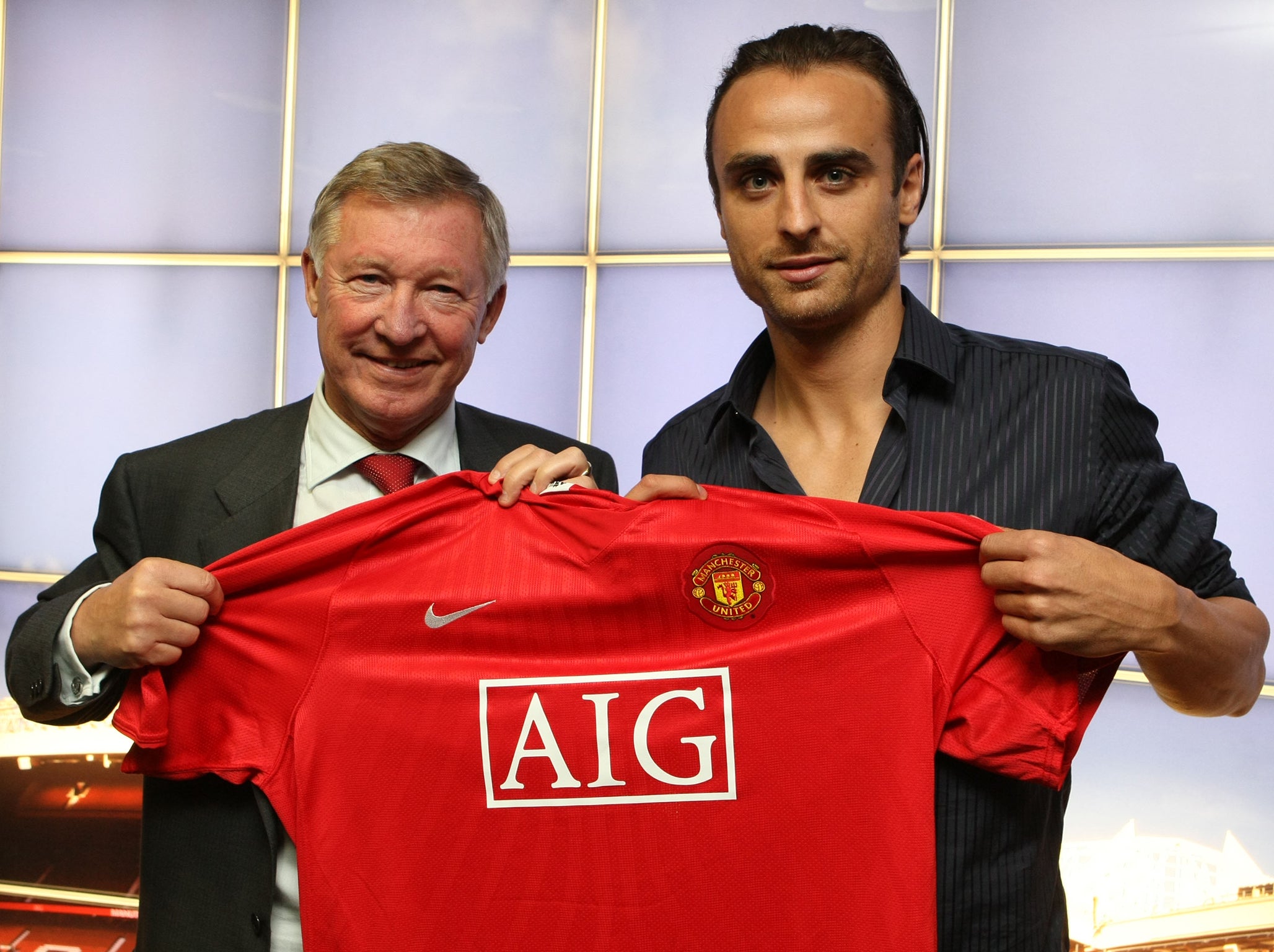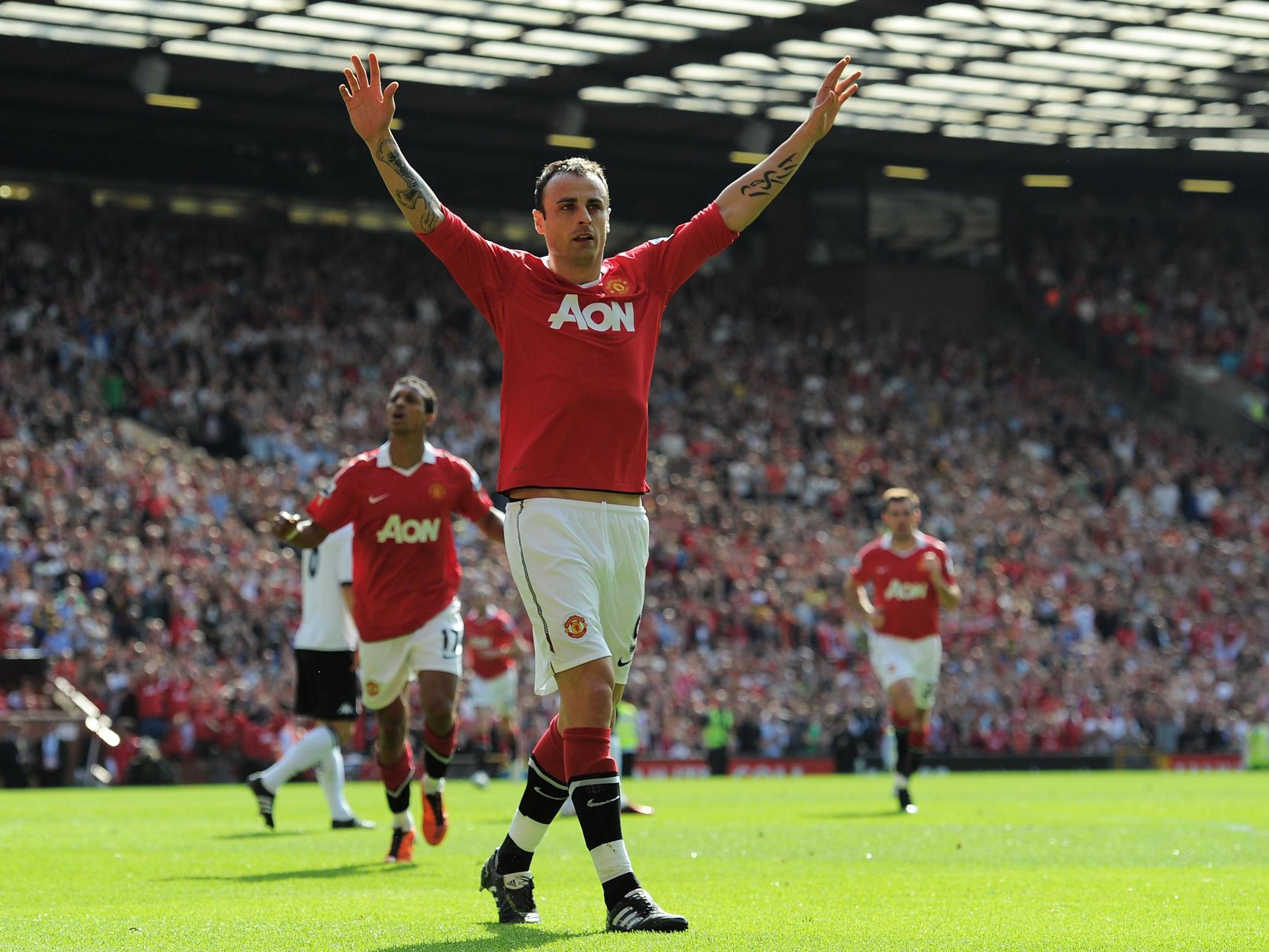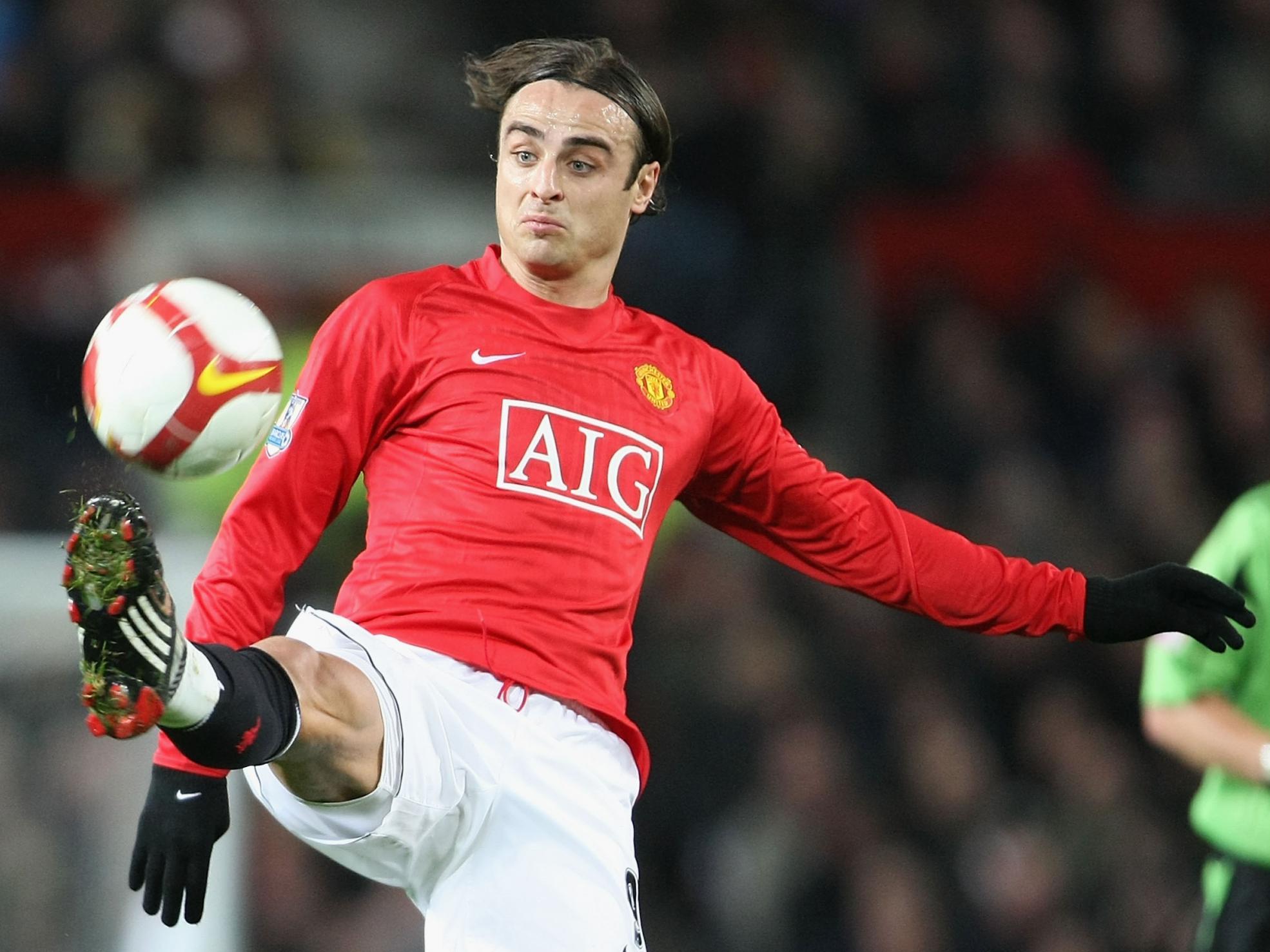Dimitar Berbatov on Manchester United, his genius, assisting Cristiano Ronaldo and the joy of entertaining
Exclusive interview: The Bulgarian took as much pleasure in creating as he did from simply scoring
It is, in short, an insight into how genius works. Dimitar Berbatov is fittingly trying to conjure words to describe a move that most players - let alone supporters - would struggle to even imagine. The former Manchester United and Tottenham forward is talking through his famous assist for Cristiano Ronaldo against West Ham United, and doesn’t even need to see the clip because it’s so clear in his head.
What he was actually going to do in the moment, however, wasn’t so clear in his head at all. It was the 30th minute of an early 2008-09 league match, and Berbatov was chasing what might have been a lost ball to the byline just outside the 18-yard box, with James Collins closing in.
“I am running towards the ball and I see the guy coming here,” the Bulgarian - now a Betfair ambassador - explains. “While I’m running, I’m thinking, ‘what do I do? What do I do?’ And this is in two seconds. Two seconds. It’s going really fast. Then, all of a sudden, you don’t even know how to describe it, you find the best way.”
And the most ingenious way. In those two seconds, Berbatov conjured a moment where he stopped the ball on the turn and then lusciously lifted it over Collins’s trailing right leg, with the same foot, in the same move.
It was spectacular, especially at such speed. And just unique.
Out of a situation where the ball was aimlessly going out of play, and through a mere three touches in two seconds in the flow of one single move, Berbatov created the easiest of chances for Ronaldo.
How he got there is almost impossible to comprehend in real time, but also begs another question about his mindset at that moment.
Did Berbatov do it that way because he was consciously trying to entertain, or because it was just the most efficient solution in the circumstances? For the vast majority of players, after all, the obvious choice would have been to try and just keep it in play and keep possession.
He laughs.
“It’s this, plus much more! For that turn, I was put in a situation where I needed to do something. So what do you do? Are you turning the other way, and just stopping the ball go out of play? But that’s a bit boring. I don’t even know how to describe it, but you want to go past the defender, you want to entertain, and you want to make the public go ‘woah!’ You just feel it somewhere, and it happens like this. I just automatically improvise and I do it.
“It’s natural.”
There are few players who looked as natural with a football as Berbatov. The Bulgarian had a mastery of the ball that just seemed organic. He is part of a highly distinctive group of players - along with Eric Cantona, Dennis Bergkamp, Gianfranco Zola, David Silva and Mesut Ozil - who have enlivened the Premier League through pure innovation, and could just make supporters stop and watch, by seemingly making the game stop. It never mattered that they were not the quickest, because they could just bend matches - and the ball - to their wondrous creativity.

They are also forwards who simultaneously fostered a distinctive tension in football, because they require a certain amount of indulgence to bring the best out of them. The question then arises over what actually is best. How much of what they do is self-indulgence, how much is serious impact? How much is empty decoration, and how much is decisiveness?
Berbatov insists this is actually the wrong way of looking at it, precisely because such players have a different way of looking at the game.
And although he won’t actually say it, it’s a more sophisticated way of looking at the game. They just see more, because they can do more. Their greater technique means they have a far greater range of possible solutions. As with that moment against West Ham, finding solutions is actually what it’s all about. It just naturally follows that the more inventive solutions will also be more the entertaining solutions, but Berbatov outright admits the reactions encouraged him to try and entertain even more.
“When you go past the player, like with West Ham, and hear the public go “woah”, it makes you want to play even more!”
To illustrate the wider point, he cites the example of Ronaldinho’s famous toe-poked finish for Barcelona against Chelsea in the 2004-05 Champions League, and Bergkamp’s “turn” - to put it mildly - of Newcastle United’s Nikos Dabizas in 2002.

“I’m sure Ronaldinho didn’t think about doing that before, it was just the obvious solution for him in that moment. Because, in his head - and it’s different to what goes in your head, or in mine - that’s what he could do. Maybe in that situation I would do something else. Maybe I would go with the outside of the foot. But for him, it’s the best solution to do, and he’s done it.
“It’s a different way of looking at the game. Some players are fighting with the ball when they have it, thinking ‘what do we do with it now?’ But for me, it was probably DNA, coming from my father, who was a football player. It is just the way I see football. I am trying to think one step ahead. I am watching you but at the same time watching what is happening there, where everybody is on the pitch. I looked for two or three solutions.
“Of course, it’s not working every time, but you do this so many times it becomes a habit. The ball is coming, and I can play it straight away over there, without looking.
“Like Bergkamp, for example. He is a pure joy to watch, this guy. But not just tricks for the sake of it, with no effect. When he is doing something, it is with a purpose.
"With West Ham, I do it close to their goal. But if I do it in our half , there will be no benefit. I can easily just keep the ball and pass it. At the by-line, it makes sense.
“Like Bergkamp with that goal against Newcastle. That’s not something he would have tried on the training pitch. This was the obvious decision for him in the game, like with Ronaldinho.
“Leo Messi then is looking at football completely different to everyone else. The moment he receives the ball, you can see by his body language that he’s so comfortable on the ball. And the moment you start running to try and get it from him, he’s already figured out fucking five solutions: where to pass it, where to run. And while he’s running he’s still seeing more solutions. This is a completely different level now. It’s something you just cannot teach. It’s just in your head.”
It’s also genius pretty much explaining genius.
And yet as elevated as Berbatov’s mindset is with how he can play, he has endearingly everyday views on what he actually does.
He first of all admits that he prefers to just create, and entertain, rather than score. He then reveals that, as natural to him as such astounding moves were - and as so many affectedly aloof celebrations also emphasised - he was all too giddy on the inside.
“To be honest, I prefer to make something like that turn against West Ham. After it, I was trying to be all modest, you know, going to say ‘well done’ to Ronaldo, pretending this is a normal thing for me. No big deal. Like, when you score a screamer and some players go nuts and some just go [rolls shoulders back] ‘this is me, this is what I do’. So I try to be cool like that but inside I am like, ‘oh my God! Do you see what I’ve done!?”
“Some players score a goal, and celebrate wildly. This is not me. Outside, this is a normal thing for me. Inside, I was celebrating.”
That’s not all Berbatov has managed to internalise. There’s also how he deals with pressure.
Partly because of how he played, Berbatov always looked so composed and insouciant that it’s impossible to imagine him feeling any way nervous, but he admits he often did. He admits he was sometimes “shaking”.
“I gave the impression I was above it but, inside, believe me, I felt the pressure. Before games, after games, especially after losing a game, missing a chance, not playing well. We’re all human beings. It doesn’t matter how much anyone pretends to be strong, you’re going to feel pressure from time to time.
"It’s how you deal with it that is the question. It’s nothing strange to speak with a psychologist. Big teams should have that, especially these days with so much abuse and criticism [on social media]. It’s going to affect your performance. If you have someone to help you through this, it’s going to be benefit you.”
But here we return to that issue of how he sees the game, and finding solutions. Did he find it more difficult in pressurised occasions?

“It’s not easy. Because, in situations like this, when the pressure is big, when the tempo is high, there are more mistakes. Everybody is starting to feel panic in some way. They rush. The way I was playing, you can calm everyone around you and say ‘guys, just trust your ability’. So if you have someone like me, who is oozing confidence and calmness, even if inside he is shaking, it’s good for the team. I played with players like this. Sometimes you are under pressure, and you look back and see [Ryan] Giggs or [Paul] Scholes, who are calm. And you’re like ‘we’ll be fine’.”
That came across in some of Berbatov’s match-winning contributions in the Premier League with Tottenham Hotspur and United, particularly those that added up to title wins. There was the cushioned one-touch volley from a ball out of the sky for a 1-0 win against Middlesbrough in 2008-09, or so many divinely devastating passes in the 5-2 comeback against his old club.
This is why Sir Alex Ferguson never told Berbatov to simplify his game. No manager did, to be fair, although he admits that the much faster pace of the modern game would probably cause him to adapt.
“Ferguson knew, not only with me, that if you give freedom and confidence to the player to do the things he can - but at the right moment - it’s beneficial for the team.
“Like with West Ham. It’s at the right place, at the right time. So if you have that ability and confidence to do it, knowing that the boss is going to be happy for you to do it, you’re going to try it. Because even if you lose the ball here, the goal is here, there is no chance.
“If I was going to play now, it’s going to be a bit more difficult for me. But because I was always proud of my brain - looking for the solution one or two step ahead - then I’d need to up my game in my head. If you’re not quick enough, you compensate with the quickness of the mind and the position on the pitch, and look much, much better than someone who is very fast.
“I did try to play sometimes more simply, to see if I feel happy, but I didn’t. To play in different ways, I betray my principle of how to play football, and it’s not going to be me any more.
And if I don’t feel happy, as any other player will tell you, I’m not going to play well.”
When he was happy, he saw solutions few other players would, and it offered up a spectacle everyone else was delighted to watch.
For more from Dimitar Berbatov, visit Betfair here.
Join our commenting forum
Join thought-provoking conversations, follow other Independent readers and see their replies
Comments
Bookmark popover
Removed from bookmarks